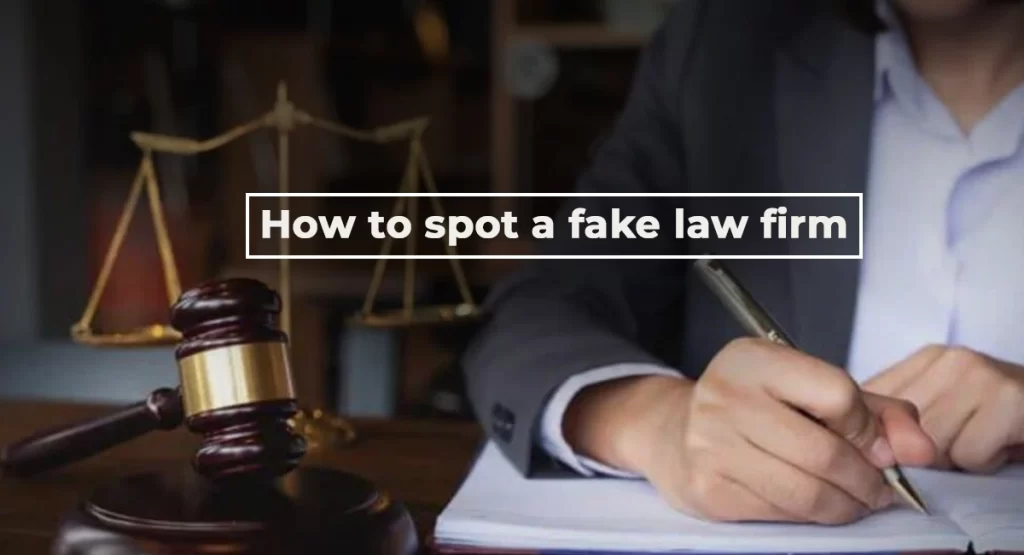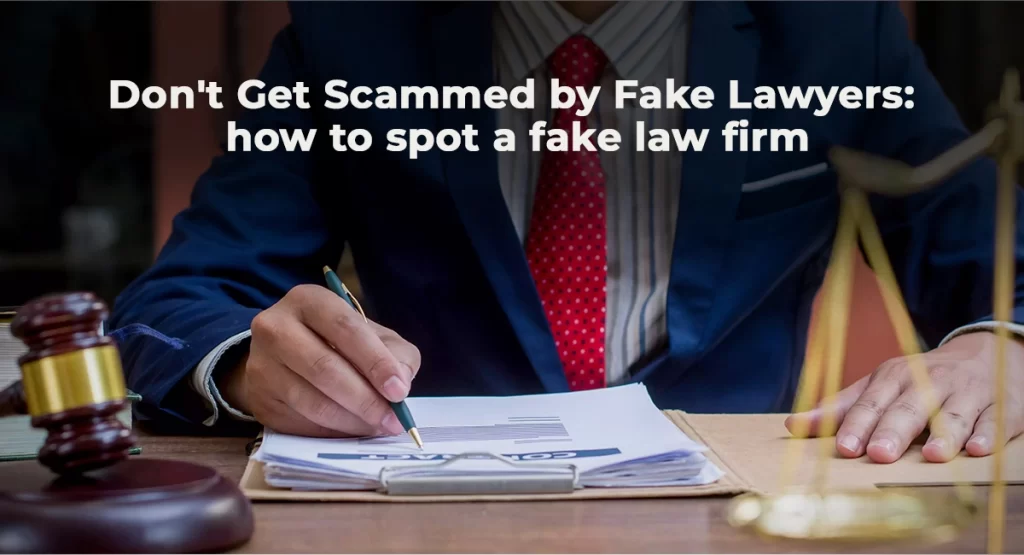In today’s digital age, the rise of online platforms and digital communication has made it easier for individuals and businesses to seek legal assistance. However, with this convenience comes the risk of encountering fake law firms or fraudulent legal services.
These scams can lead to financial loss, legal complications, and even identity theft. So, how can you distinguish between a legitimate law firm and a fake one? In this guide, we’ll explore the red flags to watch out for and provide tips on how to spot a fake law firm.
Understanding the Risks How to Spot a Fake Law Firm
Before delving into the signs of a fake law firm, it’s essential to understand why these scams exist and the potential risks they pose. Fake law firms often prey on individuals who are in vulnerable situations or seeking legal assistance for sensitive matters.
They may promise quick resolutions, offer unrealistically low fees, or claim to have expertise in niche areas of law. However, behind their facade lies deceit, as they may lack the necessary qualifications, credentials, or ethical standards to provide legitimate legal services.
Red Flags: Signs of a Fake Law Firm
Shady Online Presence: A legitimate law firm will have a professional website that showcases their areas of expertise, attorney profiles, and contact information.
If the website looks like it was built in the early days of the internet (think flashing text and awkward clipart), it’s a red flag. Look for a well-designed site with clear and concise information.
Suspicious Reviews (or Lack Thereof): Real law firms have clients, and real clients often leave reviews online. Check platforms like Google My Business, Avvo, and Yelp to see what past clients have to say about the firm’s experience and professionalism.
A complete lack of reviews, or worse, a bunch of glowing reviews that seem suspiciously generic, are cause for concern.
Unrealistic Promises and Guarantees: If a law firm promises a guaranteed win or a specific outcome in your case, run for the hills! Ethical lawyers know that the legal system doesn’t operate on absolutes.
They’ll discuss the potential risks and rewards involved in your case and outline a realistic strategy. Beware of firms that make claims that sound too good to be true – because they probably are.
High-Pressure Tactics: Reputable lawyers understand that legal matters are stressful, and they’ll work with you to address your concerns.
If a firm is pressuring you to sign a contract or make a payment immediately, especially without a detailed consultation, it’s a major red flag. Remember, the decision to hire a lawyer should be well-informed, not rushed.
Communication Woes: Difficulty reaching the firm by phone or email is a bad sign. Legitimate firms have established communication channels and will respond to your inquiries promptly and professionally. Beware of firms that only communicate through vague emails or text messages.

Tips for Verifying a Law Firm’s Legitimacy
Now that we’ve covered the red flags to watch out for let’s explore some practical tips for verifying a law firm’s legitimacy before engaging their services:
1. Research the Firm’s Credentials:
Start by researching the law firm’s credentials, including the qualifications and licensure status of its attorneys.
Check with the state bar association or regulatory body to verify the attorney’s license status and whether any disciplinary actions have been taken against them. Additionally, look for reviews or testimonials from past clients to gauge the firm’s reputation and track record.
2. Request Documentation and References:
Don’t hesitate to request documentation and references from the law firm to verify their legitimacy. Ask for copies of the attorney’s license, proof of accreditation, and any relevant certifications or memberships.
Additionally, request references from past clients or colleagues who can vouch for the firm’s professionalism and competence.
3. Schedule an Initial Consultation:
Before committing to their services, schedule an initial consultation with the law firm to discuss your legal matter and assess their suitability for your needs.
Use this opportunity to ask questions about the attorney’s experience, approach to handling cases, and fees. Pay attention to how they communicate and whether they demonstrate a genuine understanding of your concerns.
4. Check for Online Presence and Reviews:
Legitimate law firms typically have a professional online presence, including a website, social media profiles, and online reviews. Take the time to explore the firm’s website, read client testimonials, and check for any negative reviews or complaints.
While online reviews should be taken with a grain of salt, they can provide valuable insights into the firm’s reputation and client satisfaction.
5. Trust Your Instincts:
Finally, trust your instincts and intuition when evaluating a law firm’s legitimacy. If something feels off or too good to be true, it’s essential to proceed with caution and conduct thorough due diligence before making any commitments.
Remember that your legal matter is important, and choosing the right attorney can have a significant impact on the outcome.
Beyond the Red Flags: Qualities of a Reputable Law Firm
Now that you know what to avoid, let’s talk about the hallmarks of a legitimate law firm:
- Transparency and Communication: A good lawyer will explain the legal process in terms you understand, discuss fees upfront, and keep you informed throughout your case.
- Experience and Specialization: While some lawyers are generalists, many specialize in specific areas of law. Look for a firm with experience handling cases similar to yours.
- Strong Reputation: A firm with a positive reputation in the community is a good sign.
Spotting Fake Law Firms: 5 Quick FAQs
How can fake law firms hurt me?
Fake lawyers can take your money, mess up your legal case, and even steal your identity.
What are red flags for a fake law firm website?
A poorly designed site with weird graphics or unrealistic promises like guaranteed wins are bad signs.
What should I check to verify a law firm’s legitimacy?
Look up the lawyer’s license with your state bar association. You can also ask for references and see if they have good online reviews.
What’s a good way to avoid pressure tactics?
Don’t feel rushed to sign a contract or pay money. A real lawyer will give you time to think things through.
What should I do if something feels off?
Trust your gut! If a law firm seems suspicious, research them thoroughly before hiring them.
Conclusion
Spotting a fake law firm requires vigilance, skepticism, and thorough research. By being aware of the red flags, asking the right questions, and verifying a firm’s credentials, you can protect yourself from falling victim to scams and fraudulent legal services. Remember that legitimate attorneys prioritize transparency, professionalism, and ethical conduct, and are committed to advocating for their clients’ best interests. With these insights and tips in mind, you can navigate the legal landscape with confidence and peace of mind.

